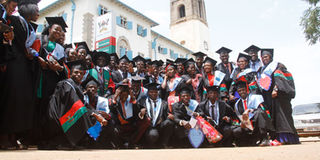Why graduates should take up fellowship programmes

Makerere University students on their graduation day. File photo
What you need to know:
- As continent with the youngest population, Africa’s greatest resource is its young minds.
- However, for the continent to realise its growth potential, these young minds have to be unblocked and empowered to excel.
- And fellowships is one aspect young African professionals can maximise.
Young African professionals often find themselves at crossroads, unsure of which direction to take in their career or if it is time to make a career change. These youths, who are trying to set their mark on the continent are always in need of advice from their seniors about how to navigate the professional world and make an impact in their society.
However, the majority of professionals being churned out of universities do not know how, or are not humble enough to seek out a mentor. The problem stems partly from the fact that a mentee has to work very hard at what they do to be able to stand out from the pack and catch the eye—and interest —of the mentor.
Unlocking young minds
Recently, Léo Africa Institute held a dinner to honour the fellows of 2018 Young & Emerging Leaders Project (YELP). The fellowship aims to train and orient values of self-reliance and dignity among young and emerging leaders in the East African countries of Uganda, Kenya, Tanzania, Rwanda, and Burundi.
The initiative is grounded in the idea that the dignity of Africa is a key moral value that can guide leadership action to cause socioeconomic transformation on the continent.
Every year, young leaders in their respective fields get an opportunity to attend the thought leader’s project. They get together to change the narrative of Africa and they meet three or four times in a year to discuss the different things that will change the society we live in and create the Africa we all want.
As the continent with the youngest population, Africa’s greatest resource is its young minds. However, for Africa to realise its growth potential, these young minds have to be unblocked and empowered to excel.
Awel Uwihanganye, an entrepreneur, communication specialist, and founder of Léo Africa Institute, stressed the fact that young people need to fight for their space. “When I was growing up, I had to constantly fight for my space. You find that people want to sit down on you. The priviledged people in society tend to be threatened by those who have come up, so you have to fight for your space. I did not allow it (the struggle) to take away my dignity. My story is the story of millions of Africans.”
This realisation that other youth were struggling to create an impact on their societies, led Uwihanganye to create a space for young people and invest in their young minds.
“Léo Africa Institute is empowering young minds to compete with their counterparts in the global north,” Uwihanganye says, adding, “But, the environment also matters. Young people need to engage with the people who make decisions, such as politicians.”
Investing time and energy
With mentoring, it is usually the young person who goes out of their way to ask to be mentored by their senior colleague. However, sometimes, potential mentors see opportunities for mentorship where none seems to be possible, as Wanjuhi Njoroge, the chief executive officer of The Web Tekies LTD and RoodEd Africa, narrated.
“I gained education and I have the desire to see others get it. I started a mentorship programme and we took laptops to schools. I found that the children could not even open the laptops because they did not know how. I realised that this was not the government’s problem; it was mine. This led me to start ICT centres.”
RootEd Africa seeks to transform lives in rural and remote parts of Africa through ICT and non-curriculum activities, such as sports and mentorship.
There is no blueprint for how one can mentor young people on how to be solutions to Africa’s problems. Not everyone can be a founder of a business startup, entrepreneur, or innovator. However, young professionals can take the initiative to find avenues to engage and empower themselves.
THE MENTEES
I have a background with the fellowship. The diversity of fellows is quite humbling. All of us are young, below 35 years, and we learn fast. We are youth striving towards achieving goals. The discussions pertain to things countries have in common. I expect to learn how to impact my fellows and also have them impact my life. That will help me change something in society.
Rayner Mugyezi, Lawyer, Kampala Associated Advocates
I was part of the fellows last year. I love that they pick people who are actually changing the societies they live in and doing things that have an impact. It is more like helping leaders to impact the people they lead because each of the fellows here enriches society in their own way and different facets of society are represented, such as, entrepreneurs, lawyers, and artists. Politicians usually forget about societal impact but it is encouraging when people notice our work and open up wider networks for us.
Allan Manzi, Film maker, singer, and song writer
In my foundation, we do advocacy and create awareness around mental health. I was a fellow last year and my experience with the programme was really enlightening. I learnt so much and my whole perspective on leadership changed because of that class. The sessions are engaging and it is something I would recommend for every leader out there. The Institute always puts out a call for applications on their website.
Liz Kakooza, founder, the Tumaini Foundation




